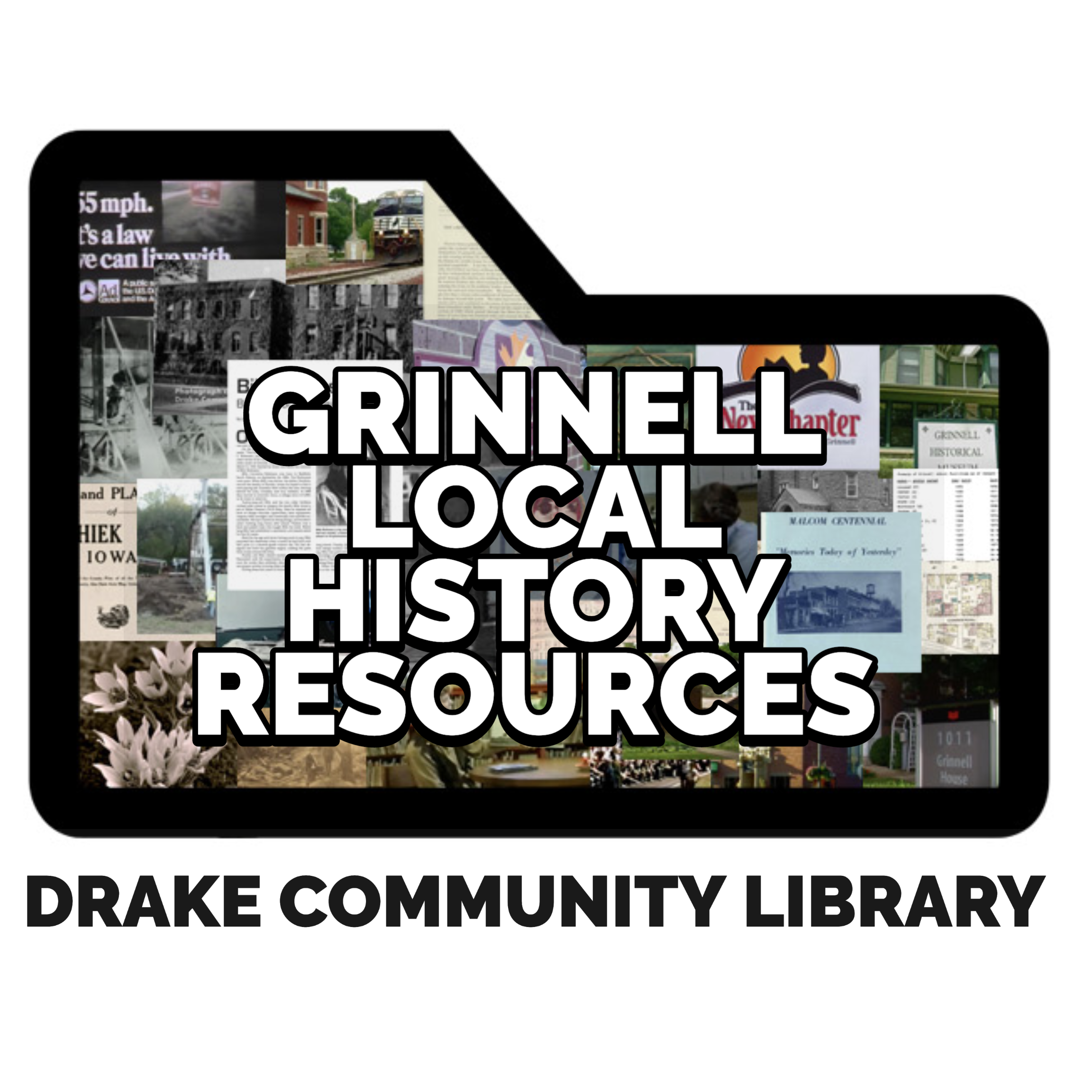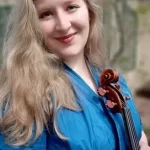The Isabella Beaton Project
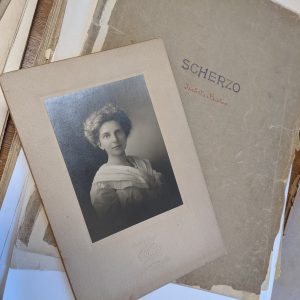
Rediscovery after nearly a century
For many years local historians have known that Isabella Beaton (1870-1929) was a somewhat successful musician. She was born and raised in Grinnell. She was a pianist who performed concerts around the country, perhaps some in Europe. She was also a composer.
Many gaps in what was known
She died in Grinnell, but the details of what happened during her final years was not clear. She was definitely a notable woman in Grinnell history, but many questions remained. In 2018 local history enthusiast Dan Kaiser began to research her story. As he dug deeper, he also reached out to anyone he could track down that might be able to fill in some of these gaps.
A gift that provided answers
One person he made contact with was Kay Doyle, Isabella’s great grand niece, who serves as the family historian. Kay had in her possession a number of materials related to Isabella’s life and work. Through a series of communications over several years, Dan and other members of the Grinnell Historical Museum were able to arrange with Kay the return of many of the Isabella Beaton materials to Grinnell.
This page tells the story of Isabella Beaton and the rediscovery of her work and music through this project.
A musician born and raised in Grinnell
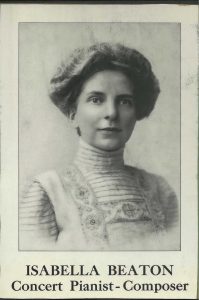
Isabella Beaton (1870-1929) was an accomplished musician born, raised, and educated in Grinnell, Iowa. During her life she was a concert pianist, composer, organist, vocalist, violinist, and educator. She performed concerts around the state, country and world. She established a music school in Cleveland during a time when it was rare for women to be working outside the home. Her compositions were performed by several orchestras, including what later became known as the New York Philharmonic Orchestra. The Cedar Falls Gazette wrote in 1906 that “with the exception of Mrs. [Amy] Beach of Boston, Miss Beaton is the only woman in the United States whose work has been recognized and publicly [sic] performed by the leading orchestras of the country.”
Born in Grinnell on May 20, 1870, Isabella had parents who were some of Grinnell’s first settlers, arriving just a year after the town was founded.
Both parents were musical, and Isabella herself early showed promise of exceptional musical ability. She began playing the piano at age four, began study at the Iowa (Grinnell) Conservatory at age nine, and gave her first public concert in Grinnell’s Stewart Hall when only twelve years old. – Dan Kaiser, Grinnell Stories: Lives to Remember (2024)
Isabella graduated from Grinnell High School in 1887 and began her studies at the college in town, then known as Iowa College at Grinnell. She graduated from the Conservatory of Music of Iowa College in 1890. After graduation, she spent several years in Harlan, Iowa, as a church musician. Then in 1894, using an inheritance from her grandfather, she went to Europe for an intense period of study with masters of the day in Berlin and later in Paris, focusing on piano and composition. She returned to the United States in 1899 and settled in Cleveland, Ohio.
A musicians life
After studying in Europe, Isabella returned to the states in 1899. Upon her initial return, she did concerts on the east coast, including New York City, where some of her own compositions were performed. She then settled in Cleveland, Ohio, to live with her Aunt Ruth Hubbard, at the Hubbard family home. Isabella’s mother, with whom she’d had a very close relationship, had died the year she graduated from high school. Ruth Hubbard was her mother’s sister and was her strongest remaining maternal connection. She would spend the next 18 years as a housemate and caregiver while she pursued her musical career.
Against this background of domestic concern and further academic study, Beaton continued to perform. – Dan Kaiser, Grinnell Stories
In Cleveland she embarked on efforts to expand her musical career. She performed concerts, taught at the Cleveland School of Music, served as the organist and choir director for the Kinsman Street Methodist Church. She pursued additional education for herself, receiving a Ph.B in 1902 and an M.A. in 1903 from Western Reserve University’s College for Women. In 1910, she founded her own school, the Beaton School of Music, while offering an ambitious season of 20 recitals per year. Throughout, she was also active in volunteer work with immigrants, missionary societies – especially related to the Armenian Genocide in present-day Turkey – and war efforts during WWI. All of this while serving as the primary support and caregiver for her aunt, whose health continued to decline.
Furthermore, as Kaiser has pointed out, Beaton’s need to support her extended family was intense. Not only did she provide for them financially—a traditionally male role—but she also performed the traditional female role of caregiver for her aunt during several illnesses, including her final two-year decline. More needs to be acknowledged about the social structures that Beaton navigated and contended. – Claire Davis, Mentored Advanced Project
After the death of her Aunt Ruth in 1918, Isabella seems to have begun to struggle to maintain her activities. The Beaton School of Music was closed by 1922 and she returned to Grinnell under the care of her sister, Carrie.
Mental illness results in a sad end
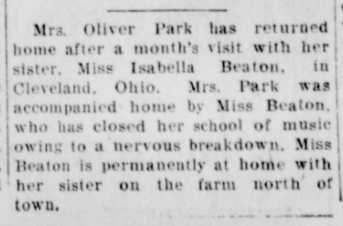
For the next several years, Beaton seems to have lived quietly; not once did her name appear on the pages of the local newspapers. Beaton gave no concerts at the Congregational Church or at the college, as she had done often in the past. – Dan Kaiser, Grinnell Stories
Evidence points to her final years being a struggle. In his Grinnell Stories post “Isabella Beaton: Queen Among Musicians,” Dan Kaiser speculated that she was suffering from severe mental illness. Since that writing, more information has been found that confirms this.
In May of 1922 the Grinnell Register reported Isabella had returned to Grinnell with her sister, Carrie, after a nervous breakdown in Cleveland.
Among the papers donated by Kay Doyle, Beaton family historian, were documents confirming her decline, noting the need for a guardian to oversee her affairs and cancellation of an insurance policy noting her “condition”. She died on January 19, 1929, in Mt. Pleasant at what was known as the Iowa Lunatic Asylum.
Even without the details of her well-being, Beaton’s last years contrast sharply with her youth and all its promise. Clearly Isabella Beaton was a very bright, very talented woman; a child prodigy, she went on to study with some of Europe’s best-known teachers, so her star was certainly ascendant when she reached Cleveland in 1899. She then plunged into a career filled with teaching, composition and performance, a pace that she managed to increase a decade later when she founded her own music school and began a round of punishing recitals, each year performing some twenty concerts. Along the way she also completed a bachelor’s and master’s degree at Western Reserve; she vigorously volunteered in her community, assisting the war effort and the battle against alcohol. And she lovingly attended to the well-being of her family, including her Aunt Ruth whose long slide into the grave she monitored every night for two years. – Dan Kaiser, Grinnell Stories
It was a sad end to a life full of promise and an admirable level of success. After her passing, she was celebrated by the community of Grinnell and those who had followed her career and supported her through the years.
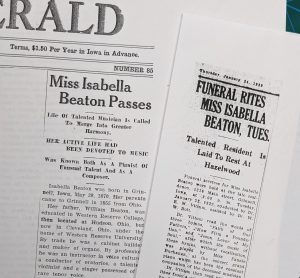
Memories of the successful Grinnell musician lingered with those who had known her. Some of her possessions, most notably her practice piano (a portable keyboard that makes no sound), became a part of the Grinnell Historical Museum collection. Her name was among those of “Notable Women of Grinnell” researched and shared as part of museum programs. But the details of her story and scores of her music were mostly lost until 2018 when Dan Kaiser began research for his Grinnell Stories piece. Through his efforts, he made contact with Kay Doyle, Isabella’s great grand niece and keeper of the family history.
Research leads to a large gift of materials
In 2018, Dan Kaiser published his Grinnell Stories post “Isabella Beaton, ‘Queen Among Musicians!‘”. Dan does in depth research into local history subjects, often reaching out to individuals to try to help fill the gaps he finds in what is known. In this case, his sleuthing connected him with a woman in Ottumwa, Iowa named Kay Doyle. Kay is the great grand niece of Isabella. She serves as the family historian and was thrilled to hear of his interest. To his delight, he found that Kay was in possession of a large number of items that had belonged to Isabella. After corresponding with Dan over the course of several years, in August 2021 arrangements were made to transfer possession of several items to Grinnell to be shared among the archives of Grinnell College, Drake Community Library and the Grinnell Historical Museum.
Isabella Beaton materials from Kay Doyle arrive in Grinnell
What do we have? Sorting and assessment
Items that had been guarded by Kay for many years were brought to Drake Community Library. Limits of time and energy had made it impossible for Kay to sort through all the materials in her possession, which is partially why there was such a delay from the time of initial discussions to when materials were transferred. Through an unusual arrangement, a collaboration of individuals from Grinnell College Special Collections, the Grinnell Historical Museum, and Drake Community Library agreed to accept the unsorted boxes of material. Knowing that there would be more sorting and assessing than with the usual donation, individuals from these three organizations agreed to work through the large group of materials to determine what pieces would be archived locally. Over the course of a few weeks, boxes of music, publicity, family letters and miscellaneous bits were sorted and assessed. In the end, a large number of items related to Isabella Beaton were added to the Grinnell College Archives, a smaller number of items remain at Drake Community Library, and the museum took possession of two dresses and some other small artifacts.
Throughout this process, there were two key questions in mind. First, what happened at the end of her life? As noted in the last section, materials were found that shed some light on the mental illness that plagued her final years. Second, what about her music? There are ten pieces known to have been composed by her, including works for piano, string quartet, orchestra and an opera. While a few of her piano pieces were in the collections locally, there were no known copies of her other compositions.
Inspiring a student research project
One person involved in this process was Claire Davis, Grinnell College class of 2022. Claire worked at Drake Community Library during her time as a student, assisting with archival projects. As a music major, she had taken a keen interest in Isabella’s story. The gift of these materials from Kay would lead to a Mentored Advanced Project during her senior year.
Claire Davis adds to the Isabella Beaton research
During her time as a Grinnell College student, Claire Davis ’22 worked at Drake Community Library as an archives assistant. It was through this work that she first became acquainted with Isabella Beaton, a musician who would become the focus of her senior year Mentored Advanced Project (MAP).
In a way, this project began in the spring of 2019, when a colleague of mine at Drake Community Library, Liz Cabelli, showed me historian Dan Kaiser’s recent blog post about Isabella Beaton and suggested that I could research her further. It was a fascinating article, and I was intrigued by Beaton; but it being the middle of the semester, I was unable to give more time to it. Then in the summer of 2021, Kay Doyle, a relative of Beaton, contacted Drake Community Library Archives, the Grinnell Historical Museum, and Grinnell College Special Collections and Archives about donating her family’s collection of Beaton’s music manuscripts, correspondence, other papers, books, and performance dresses. Both I and the collection arrived in Grinnell that August, and inventory began in September.
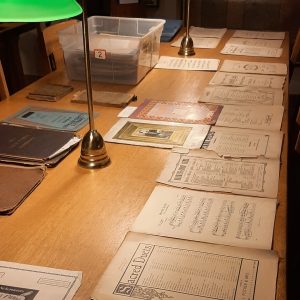
Claire’s research delved into the life of Isabella and culminated in the creation of the Critical Edition of the “Quatour pour Instruments a Cordes” (Quartet for String Instruments) and a Critical Report summarizing the findings of her Mentored Advanced Project.
Claire did an analysis of nine sources for the Quartet which contained variations and ambiguities. Using her knowledge as a musician, she compared the sources to determine what she believed Beaton most likely expected to publish. Based on consistencies among the parts and Claire’s knowledge as a string player she added suggestions for bowings, dynamics and articulation to create a Performance Edition for the piece. The music is available for download here.
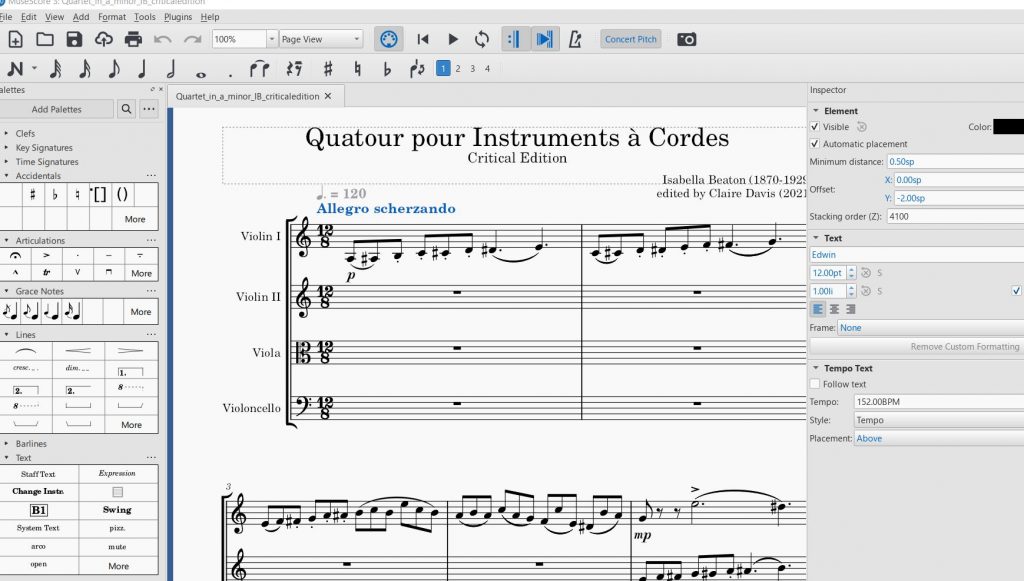
After completing her MAP in the fall of 2021, the next goal was to find a venue for performing the piece. Claire, a violist, was a part of a string quartet who was happy to perform the piece. While there were some challenges from the lingering pandemic, the public premiere for the piece took place on May 1st, 2022 at the Grinnell Historical Museum.
The first performance of the piece in Grinnell in this century
The first public performance of the piece opened the event at the Grinnell Historical Museum on May 1st, 2022.
All performance recordings shared with permission of the performers.
Quartet members are Grace Davis ’23 (violin), Jamie Lee ’23 (violin), Claire Davis (viola), and Isabella Vergara ’23 (cello).
A century later: Hearing her music again in Grinnell
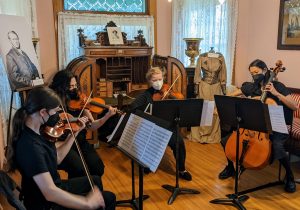
On May 1st, 2022, the Grinnell Historical Museum held a small event to reopen after being closed during the pandemic. The event was a celebration of Isabella Beaton. It including two performances of her Quartet for Stringed Instruments, one at the beginning and one at the end, as well as a presentation by Dan Kaiser on her life.
Dan Kaiser shares his knowledge of Isabella Beaton
Claire Davis speaks before the final performance of the Quartet
Claire’s comments:
I learned about Isabella Beaton first from Liz Cabelli who showed me Dan’s post. And about 2 or 3 years later I began researching her and her life when the collection came to Special Collections. I started with inventorying some of the books in her music library and that’s how I tried to narrow down my focus for the research.
The quartet is one of the few complete pieces we have of hers. The others in the Special Collections are the Scherzo for Orchestra, we have a complete set of parts for that, as well as the Landler that Dan mentioned and then this quartet
And like Dan said she gave the same life to her niece as she had for herself. So she had to care for her family and for me that tells me that she appreciated the life she had. While she may not have achieved great solo pianist success her values are very evident and the kind of life she wanted to lead are also evident.
So we will now play her Quartet in A minor one more time.
All performance recordings shared with permission of the musicians.
Beaton compositions with performance dates and notes
- Scherzo for orchestra (Schneekliid, Paris) biblioteque national.
- First played in New York City in 1899 with Emil Paur Orchestra;
- Performed by Cincinnati orchestra in 1905 and possibly by Cleveland Symphony at unknown date;
- Copy available in Grinnell College Special Collections archive
- String-quartet in A minor (Schneekliid) NY Public.
- Autograph copies of parts and printed score in Grinnell College Special Collections
- The “Scherzo” was performed at Grinnell College in November 1923
- Performed at Grinnell Historical Museum, May 2022.
- Critical Edition, Claire Davis, 2022
- String-quartet in C
- Piano version played by Isabella Beaton in Cleveland, Ohio in December 1911
- Sections include Allegro Vivace, Adagio Sostenuto and Presto Scherzando
- Romanza for violin, piano and organ
- Piano version performed by Isabella Beaton in Cleveland in 1905
- A setting of Keats’s ‘Eve of St. Agnes’
- Piano version performed by Beaton in Cleveland in 1901
- A piano-sonata in G minor(Ländler); New York Public Library
- Performed by Isabella Beaton on several occasions
- Piano sonata in F major
- Performed by Isabella Beaton in Cleveland in December 1911
- Sections: Maestoso Allegro; Andante; Presto
- Smaller piano pieces, all performed by Isabella Beaton in Cleveland, December 1911:
- Polonaise
- Prelude
- Berceuse
- Scherzo, possibly piano translation of her string Scherzo
- “Ave Maria” for Contralto and Orchestra
- Isabella was a contralto so she might well have had herself in mind as soloist.
- No known public performance
- Anacoana (opera)
- Piano selections (?) performed by Isabella Beaton in Boston in 1910 and in Cleveland in December 1911 (“Enchantment Music”)
